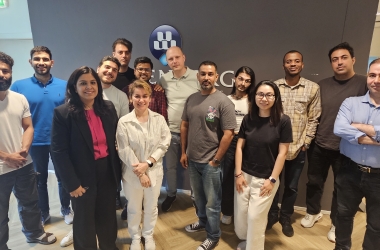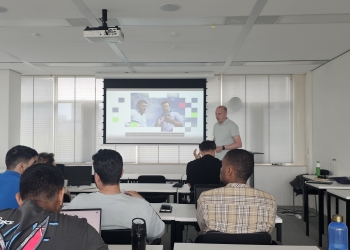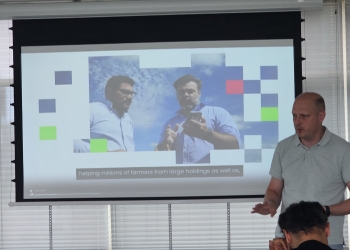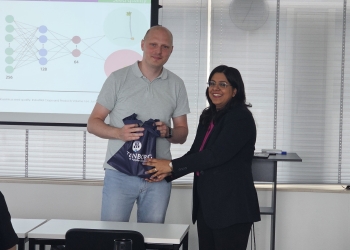Wittenborg Alumnus Oleg Voronin Talks AI, Ethics and Data Careers

Turning Data into Opportunity: AI, Ethics and Career Insights from a Wittenborg Alumnus
On 19 June, Wittenborg welcomed back alumnus Oleg Voronin to its Amsterdam study location, for a guest lecture that gave students more than just insights into artificial intelligence and data ethics – it gave them real-life tools to approach the job market with clarity and confidence.
Oleg, who has a background in chemistry and works as a Business Intelligence Analyst at Incotec Europe B.V., part of Croda’s Life Sciences division, focused his talk on the intersection of AI, machine learning, business strategy and ethics, with a special spotlight on the agriculture industry in the Netherlands.
Why Agriculture?
Oleg explained that his company plays a vital role in global sustainable agriculture, offering advanced seed enhancement technologies for vegetables and field crops.
“In the Netherlands, there are a lot of agricultural companies. This is a massive opportunity for you to find a great job,” he said, noting that the Netherlands is the third-largest agricultural exporter globally.
To illustrate the impact of data in agriculture, Oleg shared a striking example: “One gram of tomato seeds costs more than one gram of gold. Why? Because one seed can produce between 120 to 150 kilos of tomatoes. Imagine the efficiency – that’s why the cost of this seed is higher than gold.”
He walked students through the three main areas of the agricultural business: seeds, seed enhancement, and growing. Each of these, he said, relies heavily on data analysis and market forecasting.
“Imagine you have a massive green field,” he said. “Is it a good idea to sow cucumbers, tomatoes or aubergines? You first need to do a good market analysis. And if your customer – for example Albert Heijn – requires 100 kilos of tomatoes every two weeks, you need to plan your production around that or you lose money.”
The Real-World Relevance of Your Degree
Throughout the lecture, Oleg encouraged students to take what they’ve learnt at Wittenborg seriously.
“During your statistics course here, there are several instruments you use. Believe me, everything you’ve learnt in statistics is very important. This is real life. These are not academic things that you will not use,” he said.
He emphasised that data and business analysts are needed in almost every sector today – from agriculture to logistics and finance.
“Everyone requires data analysts at this point in time. There are a lot of innovations in Europe. The opportunities are there – you just have to go and find them.”
Don’t Just Learn the Tools – Understand the Business
Oleg also offered practical advice on what really matters when applying for jobs.
“They won’t pay you because you know Python, Power BI or Qlik,” he said. “They will pay you because you can find problems and give solutions. It is important to know your instruments, yes, but the most important thing is to understand the business.”
He added that understanding how to communicate across departments – from marketing and production to supply chain and R&D – is essential. “In small companies, people like to work within their own departments. You will see this constantly. As a data or business analyst, you’ll have a lot of discussions with different stakeholders. Rely on your previous experience.”
Speaking frankly about the job market, Oleg told students to consider both their strengths and their competitors’ weaknesses.
“All of you have different backgrounds. You’ll compete for data analyst positions with people who studied quantum physics or applied mathematics. You might lose out on the maths or technical knowledge. But you have something powerful – you understand the process.”
He credited his own career success not to his statistical ability, but to his background in chemistry and understanding of how business works.
“I landed this job not because I was good at statistics, but because success was based on my previous experience. Think about your current experience. If you have engineering experience and you see a position at a greenhouse in data analytics, you can connect your knowledge to energy consumption or energy supply. Don’t underestimate your previous experience.”
Creating Opportunities and Staying Practical
Oleg closed the lecture with a motivational message:
“There’s always a small chance you will land in a company – but you need to create opportunities. Look at the most active industries – choose six and identify where you want to work.”
He reminded students that failure is part of success.
“You believe I have a success story, but I have failed more than you have tried.”
He encouraged students to stay practical, pursue local certifications, learn Dutch, and even referenced classic business literature like Philip Kotler’s marketing principles as essential reading.
“Almost everything I learnt at Wittenborg, I’m using right now. Try to connect the things you’ve learnt here to make your job interview successful.”
Academic Reflections
Nikita Pahwa, Assistant Professor of Applied Sciences, reflected on the importance of the session for students entering their final block.
“For many students it is the last block of their study, so we end with some real handy tips for the job market,” she said. She also highlighted how Oleg’s lecture reinforced the real-world value of the curriculum.
“He emphasised the importance of understanding the nuances of finance, marketing, business, supply chain and statistics when preparing and presenting job applications. Effectively showcasing what is taught at the business school and linking it to specific business needs can be instrumental in achieving success in today’s job market.”
WUP27/06/2025
by Erene Roux
©WUAS Press


